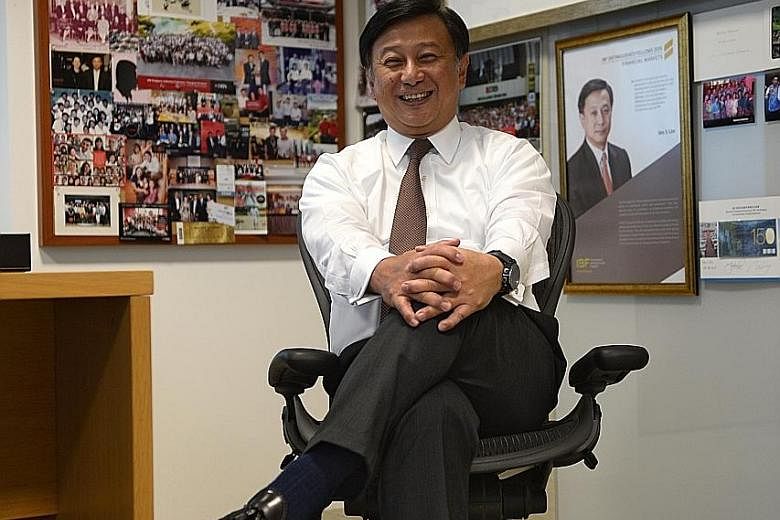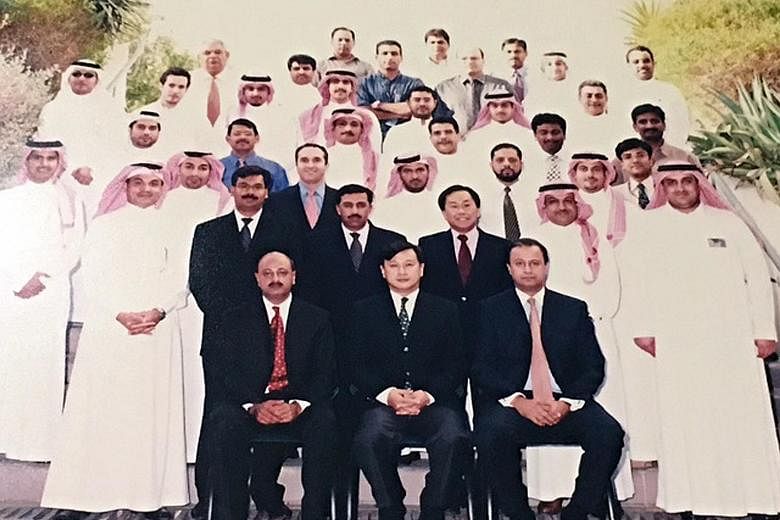Situated on the 46th floor of the Marina Bay Financial Centre Tower 3, it is an office befitting the country head of DBS, Singapore's largest bank.
The view - of Marina Bay Sands, the Esplanade and other architectural behemoths etched against a clear blue sky - is jaw-dropping.
Compelling as the tableau is, it is not a match for the booming voice of Mr Lim Sim Seng as he starts regaling me with an account of his harrowing encounter with destruction and terrorism 13 years ago.
It was 2003 and he was heading the Saudi American Bank in Riyadh, Saudi Arabia. On the night of May 12, two explosives-laden vehicles bulldozed into the Al-Hamra Oasis Village housing complex where he lived with his family.
The terrorists shot dead the compound's guards, lobbed grenades and pumped rounds of bullets from their automatic weapons into homes before setting off a car bomb near a swimming pool.
"Even though our home was not in direct line of sight of the explosion, the bomb was so powerful that it blew in the front door and shattered the windows," he says.
Mr Lim, 57, was then nearly 1,000km away in Jeddah entertaining a client but his wife and two children were at home.
Fortunately, they had gone to bed early. The assailants did not fire into their home because the lights had been switched off. His family had also drawn the curtains, which shielded them from the shattering shards of glass.
"When my wife called me, she wasn't coherent. And then the phone got cut off. Talk about panicking," he says, waving an old issue of Time magazine which chronicled the incident - involving simultaneous attacks on two other housing complexes as well - that killed nearly 40 and wounded more than 160 people.
The episode is but one chapter in the colourful life of Mr Lim, who was born into a poor family in Kuala Lumpur but went on to carve out a distinguished global banking career.
More popularly known in the industry as Sim Lim, the sturdily built banker's commanding voice and rapid-fire speech hint at a decisive soul, one used to being in charge.
The eldest son and the second of four children, he grew up in Kepong on the outskirts of Kuala Lumpur.
"My father was a failed businessman, my mother was a housewife. I have a lot of respect for my mother. She never went to school but had a lot of common sense," he lets on.
To make ends meet, the family rented out half their home to an Indian teacher and his family.
This decision had a big impact on his life. Mr Lim was then studying in Batu Road Primary, a school not exactly known for academic excellence.
Through contacts he had in Malaysia's Education Ministry, the Indian tenant arranged for him to be transferred to St John's Institution - one of the city's oldest and most reputable schools - when he was nine years old. "Who knows, if that hadn't happened, I might have become a big Batu Road gangster," he says, alluding to the area's less than savoury reputation.
At St John's, run by the De La Salle Christian Brothers Order, his robust and forceful personality blossomed.
"The Catholic brothers encouraged students to speak up. I was never afraid to speak up and was very vocal," says the school captain.
"Among my peers in school, those who loved me really supported me. And those who didn't, couldn't stand me," he adds with a laugh.
A self-starter, he harboured ambitions of studying either law in Britain or business in the United States but knew his family could not afford it.
Scholarships were his only way out. Even then, all the coveted ones were given to Malay students because of Malaysia's affirmative action programme to place more of the country's wealth in the hands of the bumiputeras.
Mr Lim decided to focus on the Monbusho programme offered by the Japanese government, and was strategic about it.
"I knew I was not smart enough to study science. If I had applied for the engineering scholarship, I would have competed with people who were 10 times smarter. So I applied for the business scholarship instead. That's where I learnt competitive advantage," he says with a grin.
The scholarship interview began on a humorous, if nearly disastrous, note. "They asked me where I was born, and I answered 'hospital'. That's because my other siblings were born at home. I only realised later how dumb that sounded. Luckily, they laughed and it broke the ice with them," says Mr Lim, who went on to impress the interviewers with his knowledge of Japan's ties with Asean.
He bagged the scholarship, which paid for all his fees and included a monthly stipend of RM1,000 (the ringgit then was on a par with the Singdollar).
"It was more than my father's monthly salary," he says.
On April 7, 1978, he boarded his first aeroplane, and took a JAL flight to Tokyo.
He spent his first year learning Japanese at the Japanese Language Centre, which is affiliated to the Tokyo University of Foreign Studies.
"It has a 24-hour language lab and is the only school in the world that I know of which has more teachers than students," he says.
The next four years were spent in Yokohama University, where he graduated with a business degree.
Upon graduation, he returned to Kuala Lumpur where he landed a job with Citibank with a starting pay of RM2,200.
With his fluency in Japanese, he had hoped to become a corporate loans officer. Instead, he was sent to the dealing room.
"I thought it was so rude, all the people shouting at one another. But when I got there, I loved it. Buying, selling, cutting your losses, you're constantly making decisions. I felt right at home," he says.
Although decent, his pay was barely enough for his needs.
Besides helping out the family, he was also putting his younger brother through university in Singapore and about to marry his Japanese girlfriend.
His boss, however, nixed his plan to accept a job in Singapore in 1987.
"He asked me why I didn't think of going to Tokyo instead. I told him no one would want me because I was too junior. He picked up the phone there and then and called Tokyo."
That very evening, Mr Lim found himself flying out to Tokyo for a new job with Citibank with a salary several times higher.
With a hearty laugh, he says he got the job nobody wanted: as a foreign exchange trader working the graveyard shift.
Japan marked another turning point in his life. It was where he met Mr Masamoto Yashiro, a famous corporate figure and former Citibank honcho, whom he credits for making a big difference in his life.
"I reported to someone who reported to him. When my boss was transferred to New York, Yashiro San asked me to report directly to him. For some reason, he liked me. It was very unusual. He was country head for Japan and I was just an assistant vice-president, which was 10 layers below him."
One day, Mr Yashiro told him: "Someone like you should go on the expatriate programme so that you can serve Citi down the road. Would you be interested?"
Mr Lim could not believe his ears.
"At its peak, Citibank had 400,000 staff around the world, of which only 4,000 were expatriates. I was then paying my own rent, living in a 600 sq ft apartment and taking the train every day with thousands of other salaried men," he says.
Besides an extremely generous salary jump and housing allowance, Citi's elite expatriate programme also meant an avalanche of career possibilities. "Being an expatriate gave me the exposure and the ability to run bigger businesses; I learnt how to think big. Your perspective becomes really different."
In 1997, he left Tokyo for New York where he ran the bank's risk treasury or balance-sheet management.
He was in the bank's dealing room on Sept 11, 2001 when two planes crashed into the North and South towers of the World Trade Center Complex.
"Our building was nearby. When the first plane crashed, I thought it was an accident. My sister called from Malaysia and my best friend from Seattle, but I told them, 'I really have no time to talk to you. The market is really busy. Can I call you back later?'
"But the second time it happened, the whole dealing room went silent. You're talking 500 people, rows of traders on four floors. Everyone was stunned."
Because he was a key man in the dealing room, he and a few others stayed back while the others evacuated.
They made their way out not long after. He was in a car with a few colleagues when the first tower collapsed. "It was like a storm of debris and dust, like a war zone," he says.
Despite the chaos, his training kicked in.
"I told myself, I got to think, I got to think. I learnt in a crisis to make short statements to myself until I get to the first thing I can act on: I need to fund the bank. I need access to information. I need to get to a computer. Where can I borrow a phone?"
After New York, he was sent to manage the Saudi American Bank - formerly known as Citibank Saudi - in Riyadh. It was, he says, like jumping from the pan into the fire.
Because of the 2003 US-led invasion of Iraq, the Middle East was rocked by instability. Just before the war officially started, Mr Lim had to put his family on the last British Airways flight out of Saudi Arabia while he stayed behind to run the bank.
They rejoined him after nearly two months, only to experience the nightmare of having their housing complex bombed.
"I tell people I went through two wars for Citi," jokes Mr Lim.
He did more than just that.
In 2008 - after stints in Singapore and Hong Kong where he was CEO - he became the president and chief executive of Nikko Citigroup.
"I was sent there to take costs down. I fired more people in Tokyo in my first six months there than in the 26 years of my life," he says, adding that he trimmed staff numbers from 1,800 to 1,100.
It was, he says, one of the most awful things he had to do; he did it by being "transparent to the bone".
He laid out how the company was doing, what the losses were, how Japan was faring.
"I also kind of said, 'Shame on our top management in New York for getting us into this mess. How can there be no shame when our share price went from US$55 to 97 cents?'"
The subprime crisis affected him personally too. He lost his pants, he says.
"At our level, more than 50 per cent of our pay was in stocks and shares. I was lucky. I was then just 50, and still had some time to make back some money. But for some of my friends who were then in their 60s, they'd have to work till they die," says Mr Lim who is now a Singapore citizen.
He left Citigroup in December 2009 and took a short break before joining DBS.
Among other things, his role as country head involves developing customer focus and creating synergy across the entire DBS franchise.
Mr Lim - whose daughter is pursuing her master's in fashion studies, and his son, a medical degree - turns philosophical when asked what he feels about his journey from a kampung in Kepong to the financial centres of the world.
Quoting Aristotle, he says courage is the first virtue because it makes all other virtues possible.
"When you go to war, you must be prepared to die. Then you can fight in peace," says the banker whose management insights have been compiled into an illustrated book called Making Banking Joyful.
His approach to living life well is simple.
"You can never be rich in life unless you learn how to be generous at heart. Because if you don't, you will always think you don't have enough."
VIDEO: Lim Sim Seng on his life philosophy




